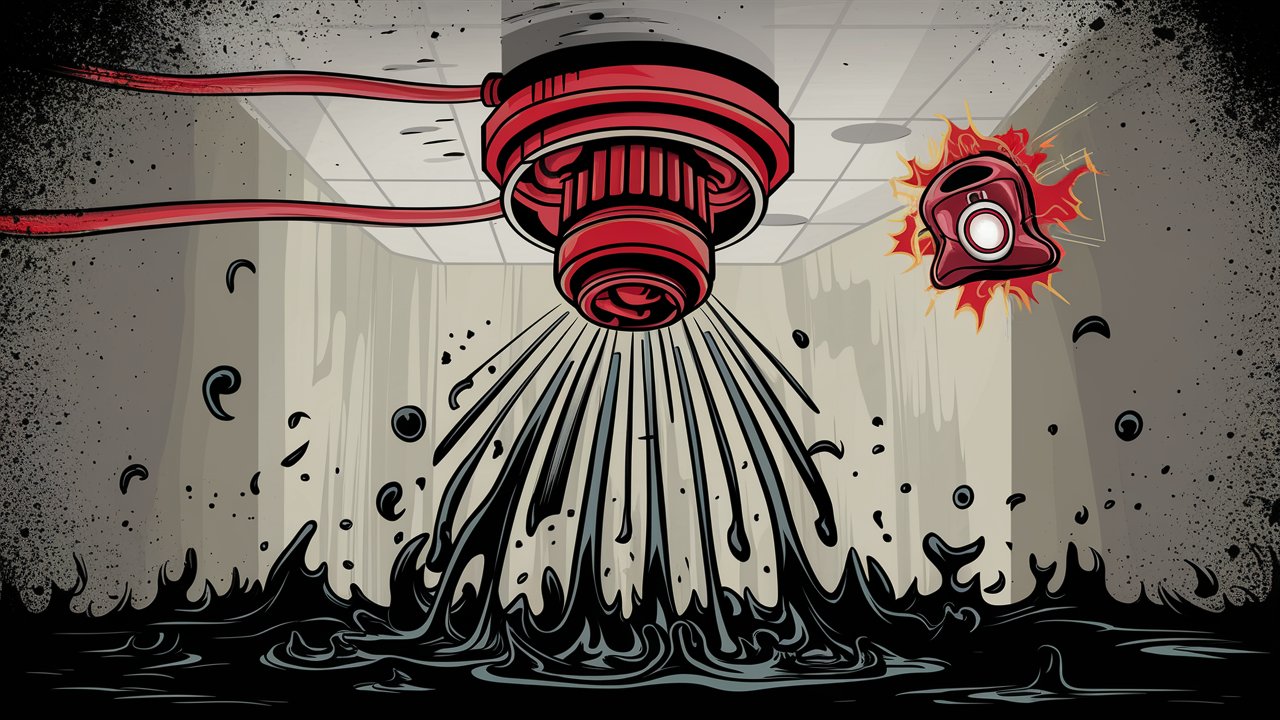Fire sprinkler water can sometimes appear black, which can be alarming and puzzling for property owners and facility managers. This discoloration is usually a sign of underlying issues within the sprinkler system. Understanding the reasons behind black water can help in addressing the root causes and ensuring the system functions properly.
Identifying and mitigating any issues causing water to turn black is crucial for maintaining the integrity and effectiveness of the fire protection system. The black color in the water is often caused by the following:
- Sediment Buildup
- Stagnation
- Oxidation Corrosion
- MIC Corrosion
- Antifreeze
1. Sediment Buildup
Sediment buildup in fire sprinkler systems is a common cause of black water. Over time, particulates such as rust, dirt, and debris can accumulate within the pipes, especially if the system is not regularly maintained. When the water is displaced during a fire event or test, these sediments can mix with the water, causing it to appear black. Regular flushing and maintenance of the system can help reduce sediment accumulation and prevent this issue.
2. Stagnation
Stagnation occurs when water remains stationary in the sprinkler pipes for extended periods. This lack of movement can lead to the buildup of organic material and microbial growth, which can contribute to discoloration. When stagnant water is disturbed, such as during a fire drill or actual fire event, it can release these accumulated materials, resulting in black or discolored water. Ensuring that the system is regularly tested and that water circulation is maintained can help prevent stagnation.
3. Oxidation Corrosion
Oxidation corrosion, often referred to as rust, is another significant factor that can cause fire sprinkler water to turn black. This occurs when the metal components of the sprinkler system, typically made of iron or steel, react with oxygen and moisture over time. The resulting rust particles can dissolve into the water, giving it a black or brownish hue. Regular inspection and maintenance of the piping system, along with using corrosion-resistant materials, can mitigate the effects of oxidation corrosion.
4. MIC Corrosion
MIC, or Microbiologically Influenced Corrosion, is a type of corrosion caused by microorganisms such as bacteria and fungi that thrive in wet environments. These microorganisms can accelerate the degradation of metal components in the sprinkler system, leading to the release of black, corrosive byproducts into the water. Implementing antimicrobial treatments and ensuring proper system maintenance can help control MIC and prevent black water issues.
5. Antifreeze
Antifreeze solutions used in fire sprinkler systems to prevent freezing can sometimes contribute to black water. Certain types of antifreeze contain additives or impurities that can interact with the system’s metal components, leading to discoloration. If antifreeze is present, it is essential to use the appropriate type and concentration and to monitor the system for any potential issues related to the antifreeze solution.
How To Prevent Fire Sprinkler Water From Turning Black?
To prevent fire sprinkler water from turning black, it is essential to implement several key measures that address the underlying causes of discoloration. Ensuring the longevity and effectiveness of your fire sprinkler system involves a proactive approach to maintenance and system upgrades. Here are some effective measures:
- Get a Corrosion Monitoring System
- Replace Galvanized Steel Piping
- Install Air Vents


